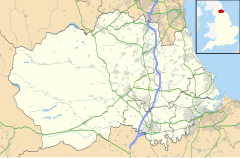
Back Durham Afrikaans Dūnholm ANG درم (إنجلترا) Arabic دورهام, انجلترا ARZ Durham AST دورام AZB Дарем Bashkir Дарэм Byelorussian Дърам Bulgarian Durham Breton
| Durham | |
|---|---|
| City and civil parish | |
| |
 Coat of arms | |
Location within County Durham | |
| Area | 14.8 km2 (5.7 sq mi) [1] |
| Population | 50,510 (2021 census)[2] |
| • Density | 3,413/km2 (8,840/sq mi) |
| Founded | AD 995 |
| Civil parish established | 1 April 2018 |
| Civil parish |
|
| Unitary authority | |
| Ceremonial county | |
| Region | |
| Country | England |
| Sovereign state | United Kingdom |
| Areas of the city (2011 census BUASD) | List
|
| Post town | DURHAM |
| Postcode district | DH1 |
| Dialling code | 0191 |
| Police | Durham |
| Fire | County Durham and Darlington |
| Ambulance | North East |
| Website | cityofdurham-pc |
Durham (/ˈdʌrəm/ DURR-əm, locally /ˈdɜːrəm/ )[a] is a cathedral city and civil parish in the county of Durham, England. It is the county town and contains the headquarters of Durham County Council, the unitary authority which governs the district of County Durham.[3][4] The built-up area had a population of 50,510 at the 2021 Census.[2]
The city was built on a meander of the River Wear, which surrounds the centre on three sides and creates a narrow neck on the fourth. The surrounding land is hilly, except along the Wear's floodplain to the north and southeast.
Durham was founded in 995 by Anglo-Saxon monks seeking a place safe from Viking raids to house the relics of St Cuthbert. The church the monks built lasted only a century, as it was replaced by the present Durham Cathedral after the Norman Conquest; together with Durham Castle it is a UNESCO World Heritage Site. From the 1070s until 1836 the city was part of the County Palatine of Durham, a semi-independent jurisdiction ruled by the prince bishops of Durham which acted as a geopolitical buffer between the kingdoms of England and Scotland. In 1346, the Battle of Neville's Cross was fought half a mile west of the city, resulting in an English victory. In 1650, the cathedral was used to house Scottish prisoners after their defeat at the Battle of Dunbar.[5] During the Industrial Revolution, the Durham coalfield was heavily exploited, with dozens of collieries operating around the city and in nearby villages. Although these coal pits have now closed, the annual Durham Miners' Gala continues and is a major event for the city and region. Historically, Durham was also known for the manufacture of hosiery, carpets, and mustard.[6]
The city is the home of Durham University, which was founded in 1832 and therefore has a claim to be the third-oldest university in England. The university is a significant employer in the region, alongside the local council and national government at the land registry and passport office. The University Hospital of North Durham and HM Prison Durham are also located close to the city centre. The city also has significant tourism and hospitality sectors.[7]
- ^ "Built Up Areas (December 2022) Boundaries GB BGG". Office for National Statistics. 27 January 2023.
- ^ a b "Towns and cities, characteristics of built-up areas, England and Wales: Census 2021". Office for National Statistics. 2 August 2023.
- ^ "City of Durham". Ordnance Survey. Archived from the original on 3 May 2018. Retrieved 20 May 2018.
- ^ "The Durham County Council (Reorganisation of Community Governance) Order 2017" (PDF). Lgbce. Archived (PDF) from the original on 21 May 2018. Retrieved 20 May 2018.
- ^ "Historian to retrace march of thousands of Dunbar captives to Durham Cathedral". BBC News. 30 August 2023. Retrieved 17 January 2024.
- ^ . Encyclopædia Britannica. Vol. 8 (11th ed.). 1911. pp. 708–710, see page 710.
- ^ "Theme 3: A City With a Diverse and Resilient Economy | Durham City Neighbourhood Plan". Retrieved 18 June 2023.
Cite error: There are <ref group=lower-alpha> tags or {{efn}} templates on this page, but the references will not show without a {{reflist|group=lower-alpha}} template or {{notelist}} template (see the help page).




